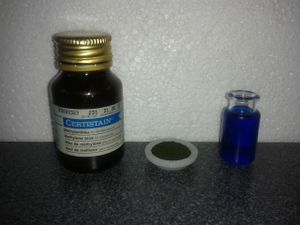Methylene blue
 Methylene blue in solid form and as aqueous solution.
| |
| Names | |
|---|---|
| IUPAC name
[7-(Dimethylamino)phenothiazin-3-ylidene]-dimethylazanium chloride
| |
| Systematic IUPAC name
3,7-bis(Dimethylamino)-phenothiazin-5-ium chloride | |
| Other names
Basic blue 9
Calcozine blue ZF Chromosmon CI 52015 Leather pure blue HB Methylthioninium chloride | |
| Properties | |
| C16H18N3SCl | |
| Molar mass | 319.85 g/mol |
| Appearance | Dark green crystals (solid) Deep blue (aq. solution) |
| Odor | Weak "skin-like" odor |
| Density | 1.757 g/cm3 (20 °C) |
| Melting point | 100 to 110 °C (212 to 230 °F; 373 to 383 K) (decomposes) |
| Boiling point | Decomposes |
| 4.36 g/100 ml (25 °C) | |
| Solubility | Soluble in glacial acetic acid, chloroform, ethanol, glycerol Slightly soluble in pyridine Insoluble in diethyl ether, oleic acid, xylene |
| Vapor pressure | 1.3·10-7 mm Hg at 25 °C |
| Acidity (pKa) | 3.8 |
| Hazards | |
| Safety data sheet | FisherSci |
| Lethal dose or concentration (LD, LC): | |
| LD50 (Median dose)
|
1180 mg/kg (rat) |
| Except where otherwise noted, data are given for materials in their standard state (at 25 °C [77 °F], 100 kPa). | |
| Infobox references | |
Methylene blue, also known as methylthioninium chloride is an organic chemical compound, a phenothiazine derivative with the chemical formula C16H18N3SCl, with many uses in in medicine, biology and chemistry.
Methylene blue should not be confused with methyl blue, which is also a histology stain, or new methylene blue.
Contents
[hide]Properties
Chemical
Methylene blue dissolves in water to form a deep blue solution.
Physical
Methylene blue is a dark green (or black-green) solid, slightly soluble in water, where it gives a deep blue solution. The solid in commonly encountered as a trihydrate. It is more soluble in glacial acetic acid, chloroform, ethanol. It has a weak odor, reminiscent to some individuals of organic tissues, like skin.
Availability
Solid methylene blue is sold by various chemical suppliers and can also be purchased online.
1% aqueous solution is available from pharmacies or pet shops.
Preparation
Methylene blue can be prepared by treating dimethyl-4-phenylenediamine with hydrogen sulfide dissolved in hydrochloric acid, followed by oxidation with ferric chloride.
However, it's much cheaper to simply buy the compound.
Projects
- Anti-microbial agent
- Cyanide and carbon monoxide poisoning antidote
- Biological staining
- Blue bottle experiment
- Sulfide analysis
- Methylene blue value of fine aggregate
- Peroxide generator
Handling
Safety
Methylene blue has low toxicity, but it stains blue almost everything it touches.
Storage
In closed amber bottles, away from light, as light degrades methylene blue.
Disposal
No special disposal is required.